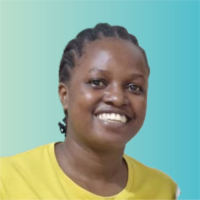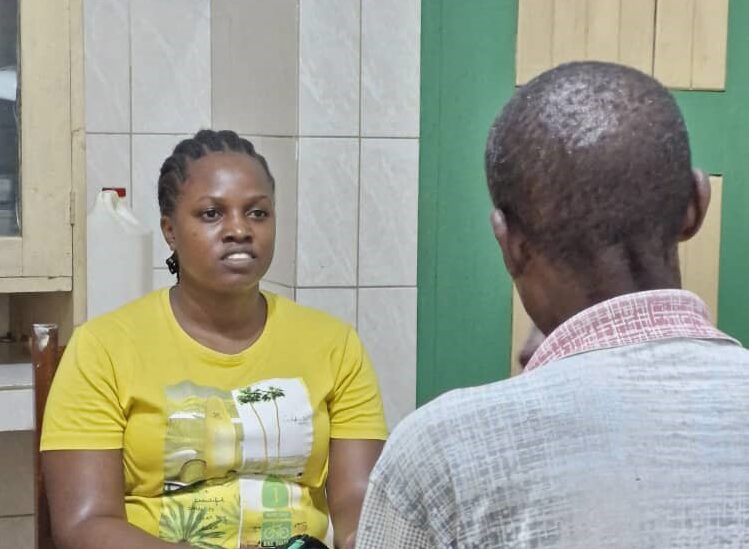
インタビュー・記事:
Witness Andrew John (One Health Society:タンザニア)

編集:
Yona Yangaza (One Health Society:タンザニア)
患者情報:
氏名: Samson Mussa Lwiga
部族: Hehe
性別: 男性
年齢: 63歳
職業: 小規模農業と漁業
彼は10年以上タバコを吸い、地酒を飲んでいます。
家族にハンセン病の陽性歴があります(祖父がハンセン病にかかったことがあります)。
彼は結婚して2人の子供がいましたが、妻はハンセン病のために彼のもとを去りました。現在は別の女性と結婚しています。
Demographic information:
NAME: Samson Mussa Lwiga
TRIBE: Hehe
SEX: Male
AGE: 63 years
OCCUPATION: Small-scale farming and fishing
He has been smoking cigarettes and drinking local brews for over 10 years. He has a positive family history of leprosy (his grandfather suffered from it). He was married and had two kids, but his wife left him due to leprosy. Currently, he is married to another woman.
診断履歴
彼のハンセン病の病歴は、1985年、24歳の時にさかのぼります。当時、彼は高熱と顔の黒い斑点に悩まされていました。かつてハンセン病を患っていた彼の祖父が、彼の病気をハンセン病の兆候と気づき、伝統的な薬を処方しました。その薬によって症状は一時的に緩和されました。
5年後、彼は2度目の発症を経験しました。今回は症状がより深刻で、高熱、顔の大きな斑点、手足のしびれを伴いました。しびれは非常にひどく、鋭い小石を踏んだり、足に砂が当たる感覚を感じるまで、スリッパをなくしたことに気づかずに裸足で長距離を歩くことができました。このとき、彼は伝統的な治療師のもとを訪れましたが、それでも症状が改善する見込みはありませんでした。病気の重症度が増したため、彼は農業や漁業を続けることができなくなり、世話をしてもらうために兄のもとへ移りましたが、義理の姉は彼を差別しました。そのため、唯一の治療法は森の中に隔離し、そこで必要な治療を受けさせることだと彼らは提案しました。
こうした孤立により、彼は病気が治癒することも治ることもなく、その上偏見によって彼は憂鬱になり、自分は価値がないと感じ、精神状態は大きく損なわれ、死しか感じられなくなっていきました。
DISEASE HISTORY
Mr. Lwiga’s first presentation of symptoms of leprosy dates as far back as 1985 at the age of 24, when he suffered high-grade fever and black patches on his face. His grandfather, who once suffered from leprosy, recognized the signs and gave him traditional medicines, which relieved his symptoms temporarily.
Five years later, he had a second, more serious episode, with high-grade fever, large patches on his face, and numbness in his hands and feet. The numbness was so severe that he could walk barefoot for long distances without realizing he had lost his slippers until he stepped on sharp small stones or felt crashes from sand on his leg. This time, he went to traditional healers, but still no hope of relief was found. The severity of the disease increased thus he failed to keep up with his farming and fishing activities. He travelled to move in with his brother to be taken care, but his sister-in-law stigmatized him. So, they suggested that the only treatment was for him to be isolated in the forests and given his needs there.
With all this isolation, he neither got healed nor cured of his illness. On top of that, stigmatization brought him depression and feelings of worthlessness. His mental health was affected very much and death was all he was feeling.
苦しみの時期はさらに6年間続き、専門家による治療がないまま合計11年間苦しみました。1996年、彼が35歳の時、光明が差し込みました。遠く離れた叔父が彼の病気を聞き、彼を助けるために保健センターに連れて行き、そこで彼の状態を検査しました。医師は彼がハンセン病にかかっているのではないかと疑い、彼にナザレハンセン病センターを紹介しました。そこで彼の状態が徹底的に検査され、彼が確かにハンセン病にかかっていることが確認されました。彼は治療を開始しました。
彼は助けが得られたことを喜びましたが、薬を飲み始めて3日後に深刻な薬物反応を経験し、胸水も合併したため、かつて輝いていた治療の光に暗雲が差し込みました。そのため、彼はセントフランシス紹介病院に1年近く入院する必要がありました。幸いなことに予後は良好で、退院して自宅に戻ることができました。しかし、誰も彼を受け入れてくれず、親戚は彼に偏見を抱き続けたため、家に戻ることは困難でした。彼の妻は2人の子供を連れて家を出て行き、別の男性と結婚しました。彼を不利な立場とみなすコミュニティで12年間病気を患った後、彼は苦労して過ごさなければなりませんでした。

1年後、彼は病気になり、肺結核と診断され、生活はさらに困難になりました。世話をしてくれる人がいなかったため、彼はナザレハンセン病センターに戻り、治療のために聖フランシス紹介病院に紹介されました。1年間の治療の後、彼は退院しました。しかし、家族や近所の人からの偏見に苦しめられたため、彼は悩んだ末、ナザレハンセン病センターに留まれるよう頼みました。ありがたいことに、彼はセンターで保護され、仲間の患者の世話などの小さな仕事を担当しました。また、生計を立てるために小規模農業などの小さな活動にも参加し、数年後、支えてくれた思いやりのある女性と結婚しました。
The moment of suffering lasted for up to 6 more years making a complete 11 years of suffering without professional care. Light shone in 1996, at age 35, his far uncle heard of his sickness and came to give him a helping hand. He took him to a health center where after evaluation of his condition, the doctor suspected him to have leprosy, and he directed Mr. Lwiga to the Nazareth Leprosy Centre. There, thorough examination of his conditions was done, and it was confirmed that he was indeed suffering from leprosy. He was started on treatment.
He was glad of the help that he was finally receiving, but ,all of a sudden, the light of treatment that once shone was dimmed due to serious drug reaction. Three days after start of his medications, he experienced a severe drug reaction that led to pleural effusion, requiring hospitalization at St. Francis Referral Hospital for almost a year. Thankfully, his prognosis was good, and he was discharged and returned home.
His return was not easy since no one accepted him, and his relatives continued to stigmatize him. His wife left with their two kids and married another man. Life was harsh, and he had to struggle to cope after 12 years of being sick in a community that termed him as disadvantageous.
The life became even harder a year later, when he got sick and was diagnosed with pulmonary tuberculosis. With no one to take care of him, he returned to the Nazareth Leprosy Centre where he was referred to St. Francis Referral Hospital for treatment. After a year of treatment, he was discharged. However, the feeling of stigma from family and neighbors ate him up, leading to make the difficult decision to seek for shelter at the Nazareth Leprosy Centre. Thankfully, he was given shelter, and he took small tasks like taking care of his fellow patients. He also participated in small activities like small-scale farming to earn a living. Few years later, he got married to another woman who is supportive and caring.
新たな始まり
彼のハンセン病との闘いの道のりは暗闇に満ち、当初は彼自身も一筋の光明も見出せませんでした。しかし、治療、新しい妻のサポート、そして支えてくれるコミュニティや友人たちのおかげで、彼は希望を見出しました。彼はもう落ち込んでおらず、言論の自由、結社の自由、そして生きる権利が尊重されています。若くて元気だった頃のように働くことはできませんが、手足の指の切断などハンセン病の後遺症が目に見えるにもかかわらず、彼は今でもコミュニティで何らかの意義を見出しています。
A new beginning
Mr. Lwiga’s journey with leprosy was filled with darkness, that he, himself, saw not a single ray of hope in the beginning. However, with treatment, support from his new wife, and a supportive community and friends, he found hope. He is no longer depressed, and his freedom of speech, association, and right to live are respected. Although he cannot work as much as he did when he was young and energetic, he still makes some significance in the community despite the visible sequelae of leprosy, such as the amputation of his fingers and toes.
メッセージ
彼の話は、ハンセン病が地域社会にまだ存在していることを強調しています。しかし、多くの場合、地域社会のこの病気に対する考えが偏見につながったり、病気の管理に迷信が取り入れられたりして、ハンセン病患者が助けを得られないことがよくあります。Lwiga氏 は、患者がハンセン病の疑いがある場合はすぐに医療処置を受ける必要があることを地域社会に理解してもらいたいと考えています。徹底的な検査の後、患者を完全に治す治療法を築くべきです。彼は、ハンセン病患者が薬を適切に服用すれば、病気を伝染させることはないと強調しています。したがって、地域社会はハンセン病患者を恐れる必要はなく、日常生活で彼らを支援するために手を携えるべきなのです。
Lwiga氏 の話で聞いたように、ハンセン病は結核などの他の病気と合併することがあります。これらの患者に効果的なケアを提供するには、統合的なケアが重要です。
「ハンセン病は、治る病気です。 」
A Message of Awareness
Mr. Lwiga’s story highlights that leprosy still exists in the community, but often, patients do not seek or receive help stemming from community beliefs about the disease, which are either stigmatization or superstition in the disease management. Mr. Lwiga wishes the community to understand that the medical attention should be taken as soon as the patient is suspected of leprosy. After thorough investigations, treatment will be established, curing the patient completely. He emphasizes that once leprosy patients are taking their medicines properly, they will not transmit the disease. So, the community has no need to fear leprosy patients but should join hands to support them in their daily lives.
As we have heard in Mr. Lwiga’ s story, leprosy can be complicated with other conditions like tuberculosis. Integrated care the is important to ensure effective care for these patients.
‘Leprosy is curable.’
皆様のお力をお貸し下さい
NTDsは通常、低所得国および中所得国の公衆衛生上の問題とみなされており、また皮膚病は多くの場合生命を奪う疾患ではないため、先進国ではほとんど注目されておらず、支援を受けられていないのが現状です。先進国では既に治療法が確立しているにも関わらず、未だ多くの罹患者がNTDsで苦しんでおり、同時に皮膚病は病変が視覚できるため、謂れのない偏見や差別を生涯に渡って受けていることも事実です。
クローバーヘルス・インターナショナルは、「顧みられない熱帯病」など開発途上国に蔓延する感染症に罹った患者の早期診断・早期治療を目標に掲げ、発展途上国でも診療管理や遠隔診療に利用のできるスマートフォンのアプリケーションを開発し、データ収集や研究に努めてきました。
令和5年6月現在、コートジボワール、ガーナの協力により、2,197名 3,486件の診療経過情報を集める事が出来ています。その多くが、後遺症発症前の早期診断の段階で治療導入ができた症例になります。
患者さん一人一人が疾病を克服し、元の生活に戻ることができ、疾病の為に失われそうになっていた様々な人生を取り戻すことが出来て、はじめてその疾患を根絶することができたといえます。我々の開発しているシステムは、大きな枠組みの疾病対策の中では見過ごされがちな、一人一人の幸福を取り戻すことを最終的な到達目標としています。


